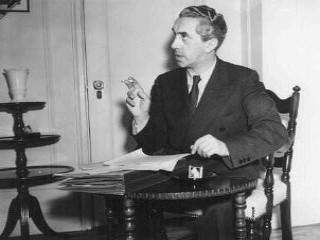
Ernst Toller biography
Date of birth : 1893-12-01
Date of death : 1939-05-22
Birthplace : Samotschin, Germany
Nationality : German
Category : Famous Figures
Last modified : 2011-04-15
Credited as : Playwright, Expressionist plays, Die Wandlung/Transfiguration
The German playwright Ernst Toller was one of the best-known of the dramatists of the expressionist school.
Ernst Toller was born on Dec. 1, 1893, at Samotschin near Bromberg, the son of a businessman. He studied at the universities of Heidelberg, Munich, and Grenoble. In 1914 he volunteered for war service, but the experience of the trenches changed his life. Released from the army after a breakdown, Toller then gravitated toward the left in Bavaria and in 1917 was sentenced to imprisonment for pacifist views and activities. During this incarceration he composed his first play, Die Wandlung (1919; Transfiguration).
Transfiguration is an exemplary work of the expressionist theater. The title points to that transformation of heart and soul which is the theme of many expressionist plays. The drama proceeds in a series of stages (Stationen) and depicts a man's "way." It intermingles scenes portraying external events with others displaying the activity of the subconscious mind. The horrors of war transform the hero from a patriotic volunteer to a revolutionary fighter for humanity.
In 1918 Toller became a member of the Central Committee of the Workers', Peasants', and Soldiers' Councils in Bavaria. In 1919 he was jailed for 5 years for his part in the abortive Eisner coup. During this imprisonment Toller composed his two other best-known plays, Masse Mensch (1920; Mass and Man) and Die Maschinenstarmer (1922; The Machine-wreckers). These works express the disillusionment of the frustrated revolutionary. The former is cast in the abstract expressionist mold, the characters being representative types, the Woman, the Husband, and so on.
The Woman represents the humane idealist who longs for change but abhors violence; and her antagonist, the Nameless One, regards violence as necessary and subordinates the individual ruthlessly to the supposed welfare of the masses. The Machine-wreckers is a more realistic play based on the Luddite disturbances in England in 1815; here again the hero is a social idealist destroyed by the hate of those he wishes to save.
Of Toller's further plays the most notable is Hinkemann (1922), an interesting treatment of the returning soldier motif. Toller moves away from avant-garde technique and abstract characters both here and in Hoppla, wir leben! (1927; Such Is Life), a sarcastic depiction of the Roaring Twenties. Of his prose works, all essays, Briefe aus dem Gefängnis (1936) deserves mention. His later dramas Feuer aus den Kesseln (1930) and Die blonde Gottin (1932) are of less interest.
The tragedy of Toller's themes reflects the disillusionment of his life. He left Germany in 1933 and committed suicide in New York on May 22, 1939.
Toller's autobiography is I Was a German (1933; trans. 1934).
















